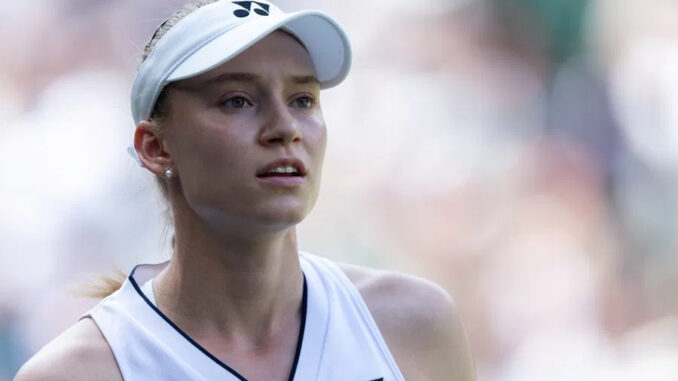
In the high-stakes world of professional tennis, where every serve and volley carries the weight of expectation, Elena Rybakina has emerged as a figure of quiet resilience. The 25-year-old Kazakh star, who etched her name into history with a stunning 2022 Wimbledon victory, recently peeled back the layers of her stoic exterior to reveal the emotional toll of her journey. Nearly three years after hoisting the Venus Rosewater Dish, Rybakina opened up in a candid conversation, reflecting on the relentless pressure that has shadowed her since that career-defining triumph. “We lose more than we win in the end of the day,” she admitted, her words a raw acknowledgment of the sport’s unforgiving nature and the personal battles she’s fought to stay afloat.
Rybakina’s Wimbledon win was a fairytale turned reality. At just 23, she stormed through the draw as the 17th seed, toppling formidable opponents like Bianca Andreescu, Simona Halep, and Ons Jabeur in a gripping three-set final. That victory—3-6, 6-2, 6-2—marked her as the first Kazakhstani to claim a Grand Slam title, a moment of national pride that thrust her into the global spotlight. But beneath the muted celebration—a subtle fist pump and a relieved sigh—lay a torrent of nerves. “I was super nervous before the match, during the match… happy that it finished, to be honest,” she’d said at the time, hinting at the tension that gripped her even in victory. What followed, however, was a rollercoaster of highs and lows that tested her mettle in ways she hadn’t anticipated.
Since that golden summer, Rybakina’s career has been a paradox of brilliance and struggle. She soared to a career-high ranking of No. 3 in 2023, clinching WTA 1000 titles at Indian Wells and Rome, and reaching the Australian Open final. Yet, the road has been strewn with obstacles—illnesses like bronchitis, nagging injuries to her back and beyond, and a revolving door of coaching changes. Her 2025 season, still in its infancy as of late March, has already mirrored this pattern. After a promising Middle East swing with semifinals in Abu Dhabi and Dubai, she faltered in the Sunshine Double, exiting in the first rounds of Indian Wells and Miami. It’s a stark reminder of her own words: losses outnumber wins, and the sting of defeat lingers longer than the thrill of success.
What sets Rybakina apart isn’t just her towering 6-foot frame or her ferocious serve—once clocked among the tour’s most lethal—but her introspective take on the mental game. “Well, I think the most difficult is that you expect a lot from yourself,” she shared in her recent reflections. “It’s not really expectations of other people. Then when something doesn’t go your way, you’re getting upset.” This self-imposed pressure, she explained, is a double-edged sword, driving her to greatness while threatening to unravel her when results falter. Her 2022 Wimbledon run, though triumphant, came with a cost: the weight of proving it wasn’t a fluke. Each subsequent tournament became a proving ground, amplifying the stress of living up to her own lofty standards.
Rybakina’s antidote to this relentless cycle lies in her support system—a lifeline she credits for keeping her grounded. “This is where it’s important who you surround yourself with,” she emphasized. “You need some kind of support. Someone who can push you. The team who believes in you. Family, friends…” Her team has seen its share of turbulence, from parting ways with longtime coach Stefano Vukov in 2024 to a brief stint with Novak Djokovic’s former mentor Goran Ivanisevic, only to reunite with Vukov for 2025. That reunion raised eyebrows, given past reports of his intense methods clashing with her temperament, but Rybakina’s focus remains unshaken. “What can you do? Nothing,” she said of setbacks. “You just need to keep on going again. That’s how I see it.”
Her story is one of contrasts: a childhood split between gymnastics and ice skating, abandoned for tennis at her father’s urging when her height outpaced those dreams; a late switch from Russia to Kazakhstan in 2018 that fueled her rise; and a personality that marries icy calm on court with a warmth that spills out in rare, unguarded moments. That 2022 final, where she overcame a set deficit against Jabeur’s artistry, showcased her clutch gene—a trait her early coach once called a “gift” for thriving in tight spots. Yet, as she navigates the 2025 season, now ranked No. 8, the question looms: can she reclaim the pinnacle?
Rybakina’s honesty offers a window into the psyche of a champion wrestling with her own narrative. She’s not chasing external validation but an internal peace, a balance between ambition and acceptance. As she prepares for the clay season, her resilience shines through—not in flashy celebrations, but in the quiet determination to press forward. “Maybe I proved… that I can actually win a Grand Slam, believe more in myself,” she once mused after Wimbledon. Now, with every loss and every win, she’s proving something else: that even in a sport of constant defeat, the will to endure might be her greatest triumph yet.
Leave a Reply